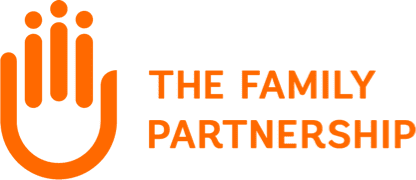Trinette Potts, EGG Project Manager at The Family Partnership, is leading the 2024-25 pilot expansion of EGG Toolkit into preschool and Early Childhood Family Education (ECFE) sites across Minnesota. With over 24 years of experience in early childhood education, Potts is excited to bring this innovative curriculum to classrooms statewide, helping 3- to 5-year-old children build the executive functioning skills they need to succeed.
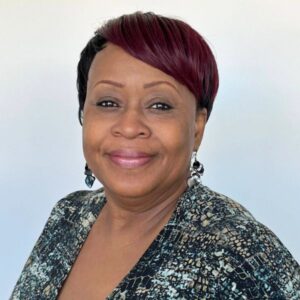
Trinette Potts, EGG Project Manager at The Family Partnership
“I’m passionate about this work because I’ve seen firsthand the impact EGG can have on kids and their teachers,” says Potts. “We’re dealing with a lot of dysregulation in classrooms, and this program provides the support both teachers and students need.”
Potts’ career began in direct care as the owner of a childcare business and grew into roles including director, business consultant, and professional development specialist. Her leadership in early childhood education is rooted in a deep understanding of the challenges teachers face daily. “We know teacher burnout is high right now,” she explains. “Many are leaving the field, and we want to give them tools to feel empowered in their classrooms.” Given her extensive experience in early childhood education, Potts is the perfect leader to oversee efforts to scale EGG Toolkit’s curriculum, training, and implementation in Minnesota.
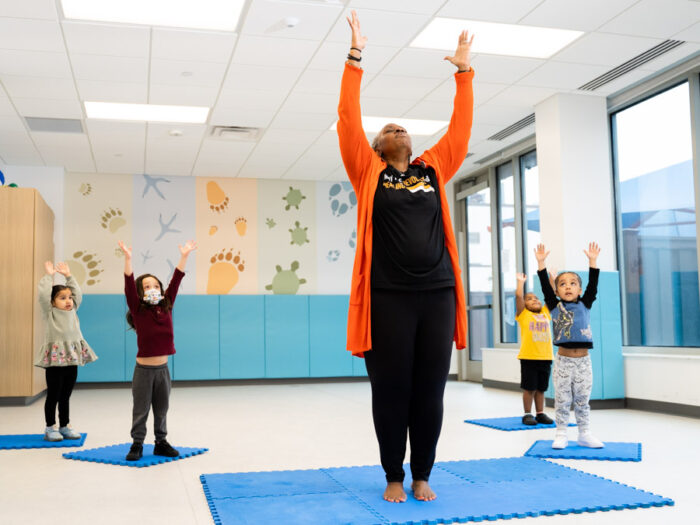
Mindfulness is one of the building blocks of executive functioning. Children use mindfulness skills to “re-set” and focus during stressful situations.
The history of hatching EGG
The Family Partnership designed EGG Toolkit (short for “Empowering Generational Greatness”) in 2017. The idea for EGG began when John Everett Till, Chief Operating Officer, learned that the earliest effects of childhood trauma manifest in the disruption of executive function development during the ages of 3 to 5 years.
According to Harvard Center for the Developing Child, “Executive function and self-regulation skills are the mental processes that enable us to plan, focus attention, remember instructions, and juggle multiple tasks successfully. The brain needs this skill set to filter distractions, prioritize tasks, set and achieve goals, and control impulses.” These early years are exactly the time when brain development is fastest and most foundational for building executive function and self-regulation skills and sets a foundation for children’s success in kindergarten and beyond.
John approached Christine Wing, CCC-SLP, PhD, about developing an early childhood intervention that could buffer children against the harmful effects of ACEs and boost kindergarten readiness. Together, John and Chris developed EGG in collaboration with early childhood educators and leading experts in brain science, child development, and curriculum design.
Today, EGG Toolkit is available in adaptations for preschools, home visiting programs and parenting groups. All variations focus on building executive function and self-regulation skills in children ages 3 to 5, with support from caregivers and educators. These skills are essential for academic success and overall well-being, as they help children manage their emotions, make healthy choices, and thrive in the classroom.
Developing an early childhood intervention for trauma
EGG is particularly effective in addressing challenges like Adverse Childhood Experiences (ACEs) by providing children with the language, storytelling, and mindfulness tools to navigate stress and trauma. These activities help foster a calmer, more focused learning environment, which in turn reduces behavioral disruptions and teacher burnout.
ACEs are traumatic events or experiences that occur in a child’s home or community. These can include abuse, neglect, and aspects of a child’s environment that impact their safety, stability, and sense of belonging. Family separation, racism, poverty, and community violence are also considered traumatic experiences.
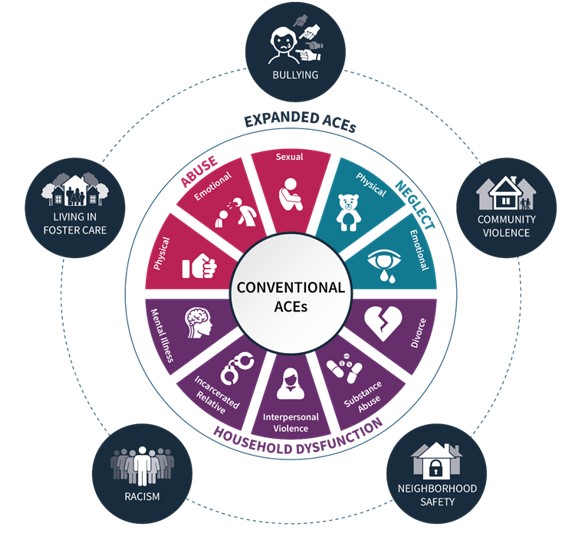
ACEs can include abuse, neglect and aspect’s of a child’s environment that impact their safety, stability, and sense of belonging. Graphic source: Minnesota Department of Health
ACEs are common. In fact, nearly one in two children (47%) in Minnesota report at least one ACE. However, research has shown that in Minnesota, American Indian and African American adults have three times the ACEs scores of their white peers. These early experiences of trauma and toxic stress impact a child’s developing brain and have lifelong consequences.
Research shows that the more ACEs a child experiences, the more likely they are to have negative outcomes in their lives including heart disease, diabetes, obesity, depression, substance abuse, and poor school performance. By building executive function and self-regulation skills, EGG Toolkit buffers against ACEs and supports healthier outcomes across a lifetime.
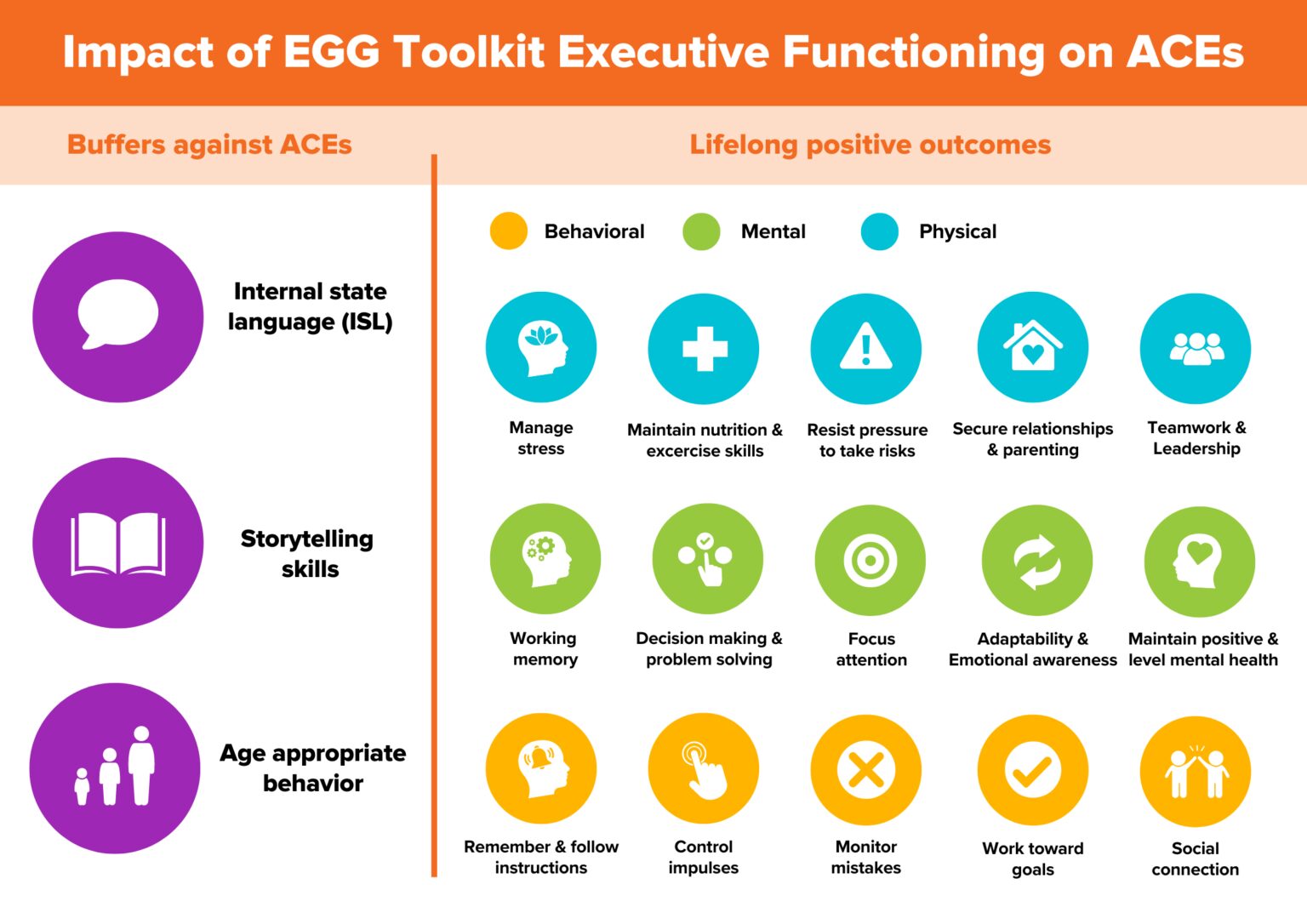
EGG helps to buffer children against the harmful impacts of ACEs, closing opportunity gaps in childhood and supporting a lifetime of better outcomes for physical, mental, and behavioral health. Graphic sourced from Center on the Developing Child – Harvard University
Creating a recipe for success in kindergarten—and beyond!
Opportunity gaps and disparities that result from inequity occur long before a child enters school. Early interventions like EGG help children develop essential skills for success in kindergarten, which predicts better outcomes throughout grade school and into their adult lives.
We’ve already seen amazing results from previous pilots. Kids who start below the national average in executive function are surpassing their peers after just a few sessions of EGG.
Trinette Potts, EGG Project Manager at The Family Partnership
“We’ve already seen amazing results from previous pilots,” Potts notes. “Kids who start below the national average in executive function are surpassing their peers after just a few sessions of EGG.”
EGG Toolkit addresses over half of preschool competency standards across multiple domains, supporting kindergarten readiness standards established by the state and assessments of a child’s total well-being and strengths. By building executive function and self-regulation skills, EGG helps children learn how to learn.
The benefits of EGG begin in the preschool classroom and they will continue as children grow up to become parents themselves. With greater capacities for resilience and focus, as well as language, storytelling, and mindfulness skills, parents can build more secure attachments. Their children also benefit from improved health, wellbeing, and prosperity.

Nurturing joy in preschool classrooms
The benefits of executive function and self-regulation skills begin in the preschool classroom, making EGG a critical support for educators in a challenging industry. Since COVID-19, Preschool administrators are seeing increased behavioral challenges and developmental delays that add to the stress of early childhood educators. According to a survey of early childhood educators in Minnesota by the National Association for the Education of Young Children (NAEYC) in the fall of 2022, 50.7% of respondents were experiencing staffing shortages. 74.7% of those surveyed were experiencing burnout and 35% were considering leaving the field.

“We know that right now in our field, there’s a lot of teacher burnout,” Potts said. “Teachers are leaving the field and there’s teacher turnover. We want teachers to be happy in the classroom.”
EGG Toolkit helps nurture joy in the classroom, because children have the skills they need to focus, plan, and regulate their emotions and behavior. As a result, they are better able to learn the material presented by their teachers and build positive relationships with their peers.
In just 30 minutes per day, evaluation from the University of Minnesota’s Center for Early Education and Development (CEED) showed that EGG Toolkit had positive impacts on age-appropriate classroom behavior. After using EGG, children increased age-appropriate classroom behavior by 7.4 points—a statistically significant change with a large effect size.
Preschool teachers reported that EGG also had a positive effect on their classrooms’ atmosphere. “I saw positive growth into putting names into emotions,” one teacher from San Antonio shared. “They don’t act out. They explain why they need space and are in tune with their feelings.”
By building focus and resilience, EGG supports positive learning environments for learners and educators.
We know that right now in our field, there’s a lot of teacher burnout. Teachers are leaving the field and there’s teacher turn over. We want teachers to be happy in the classroom.
Trinette Potts, EGG Project Manager at The Family Partnership
Promising results show the benefits of EGG Toolkit
Evaluation of our pilot programs shows that EGG Toolkit increases executive function skills, and these results are especially significant for children who have experienced household or systemic trauma. We have several years’ worth of data and outcomes, but these are some of the highlights from our research partners:
- The Center for Early Education and Development at the University of Minnesota found that EGG demonstrated a significant impact on emotional descriptive language, positive age-appropriate behavior, and personal narration—all highly correlated with executive function skills.
- Language sample analysis by Salt Software determined the complexity of children’s narratives increased after using the EGG toolkit.
- Results from the Minnesota Executive Functioning Scale app from Reflection Sciences showed that children who started below the age-adjusted median for executive function scored above the age-adjusted national median after using EGG.
Empowering Generational Greatness across Minnesota
Training for staff at our 2024-25 pilot sites has already begun. Preschools are expected to begin implementation this fall, and ECFE programs are slated for spring 2025. Based on our success in previous pilots, Potts is eager to see EGG reach more communities, knowing it has the potential to change the lives of children, families and educators.
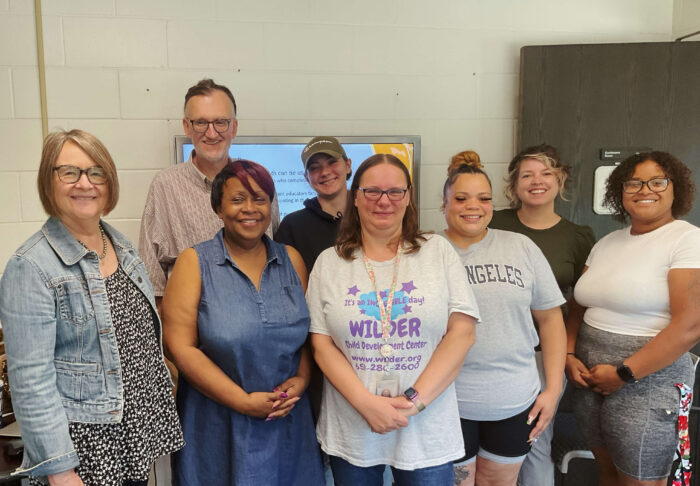
Trinette Potts, John Till and Chris Wing pause with staff from the Wilder Child Development Center during training in August 2024.
“This isn’t just about improving classroom behavior. EGG builds lifelong skills,” she says. “We’re also involving parents and caregivers in the process, so the benefits extend beyond the classroom.” According to Trinette, the importance of executive functioning is not known by many early childhood professionals, which is why she is so passionate about providing training to educators and staff. Participants in EGG Toolkit’s training will also receive credit that counts towards their development records and licensing requirements.
Potts said her favorite part of the training so far is witnessing the excitement of teachers. She said, “I love seeing the lightbulb moment for teachers. They get excited about the tools and how they can use them in their classrooms.”
One word that Potts uses often when discussing EGG Toolkit is “intentional.” The toolkit provides activities that help teachers, parents, and caregivers be more intentional in their interactions with children and that is why it works. For parents and caregivers participating in ECFE pilots, EGG Toolkit offers a 2Gen approach that builds awareness of executive functioning and skills the whole family can use.
Giving children and families the tools for executive functioning and self-regulation means giving them the skills to navigate the world. That changes the trajectories of families’ lives.
Trinette Potts, EGG Project Manager at The Family Partnership
By engaging parents and caregivers in the process, EGG Toolkit serves to strengthen bonds between family members—supporting a secure, loving environment for learning and growth. This is especially important for parents and caregivers who have ACEs themselves. Trinette said, “Giving children and families the tools for executive functioning and self-regulation means giving them the skills to navigate the world. That changes the trajectories of families’ lives.”
Visit www.eggtoolkit.com to sign up for our newsletter and learn more about how EGG builds lifelong focus and resilience in children 3-5 years old—and the adults who support their success!
In honor of World Mental Health Day on October 10, support Minneapolis preschoolers in play therapy and other healing programs at The Family Partnership!
Play therapy is proven to help children heal from trauma, process emotions, and improve disruptive classroom behaviors. Early interventions like play therapy at The Family Partnership help hundreds of young children in Minneapolis build a foundation for healing and success in school.
Just $20/day covers weekly play therapy that keeps a young child on the path to success.
Your donation will help children like Paloma
With teary eyes and an aching throat, four-year-old Paloma wondered why no one understood her and she was always getting in trouble. Her teacher, Mr. Dan, was soothing her best friend, who was crying because Paloma had gotten frustrated and thrown her shoe at her. Paloma had been trying to get her needs met in the only way she knew how – by screaming and reacting impulsively.
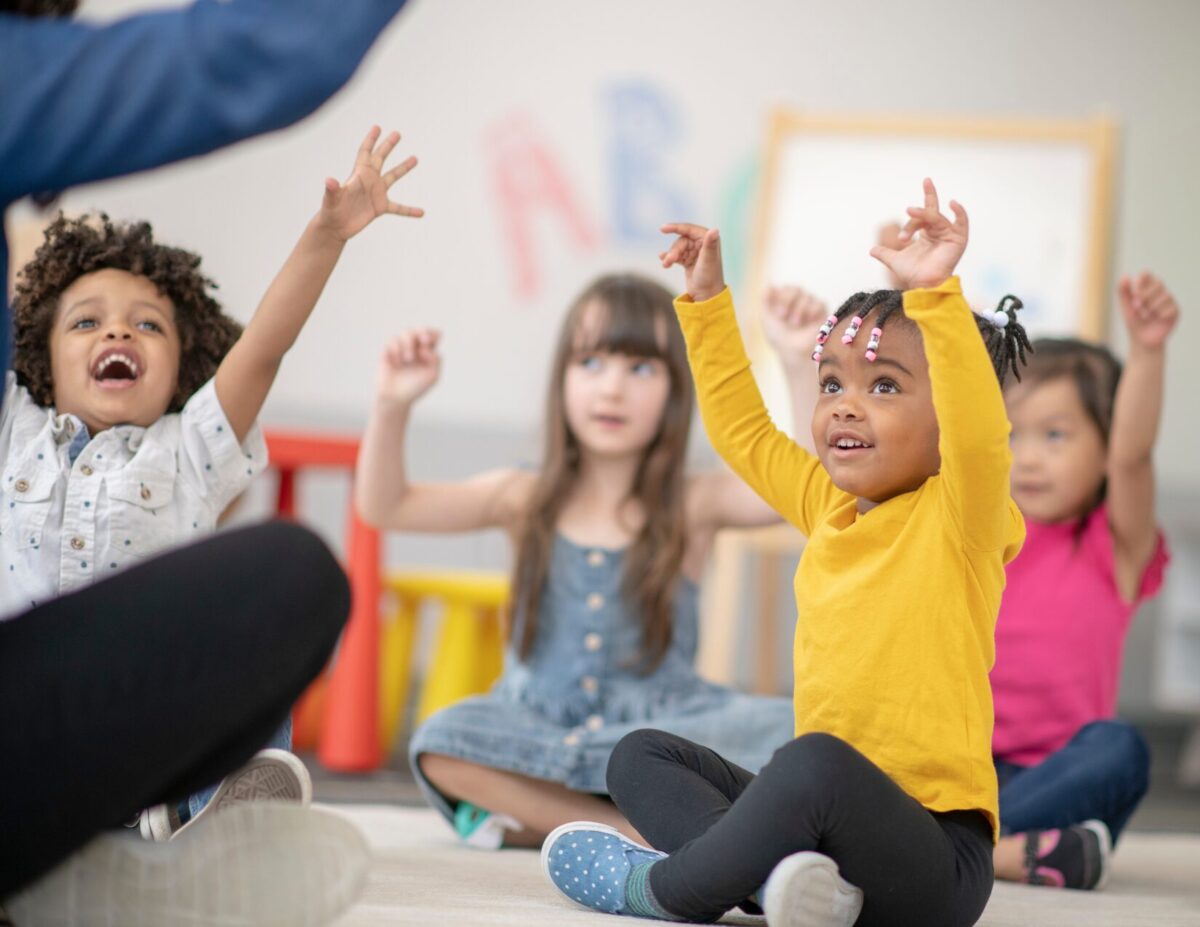
Paloma is a four-year-old student attending our preschools. For Paloma and hundreds of Minneapolis children, play therapy at The Family Partnership provides a safe place to express their experiences and feelings.
Thankfully, Ms. Sara walked into the classroom, and Paloma’s attention shifted. They went to a playroom where Paloma screamed, jumped and played without getting in trouble. She ran straight for her special toy. “Rawrrrr!” She ran back to Ms. Sara screaming with the stuffed tiger. “I eat you,” she said as she pretended the tiger was biting her. Paloma then slammed the tiger into a smaller toy repeatedly. Ms. Sara softly asked, “How is the tiger feeling?” Paloma looked up and said, “Feels icky and I want it out.” Ms. Sara ended the session by asking Paloma to take a few deep breaths before entering the classroom again.
Paloma had seen her family coping as best as they could through continued community gun violence and family instability. Spending time with Ms. Sara helped her process and make sense of these experiences.
As Paloma approached graduation this past August, her disruptive behaviors in the classroom occurred less frequently. Ms. Sara reported that Paloma now played with a kitten during therapy, showing her progress from aggression and frustration to calm and playful. She no longer threw shoes when she got frustrated because the preschool provided the space and support to work through her trauma and experiences. Even at her young age, Paloma now knew what she was feeling and how to talk about those feelings, including asking for help.

Now through midnight on October 10th, support Minneapolis preschoolers in play therapy and other healing programs at The Family Partnership
Together we can support early interventions that are proven to help children heal from trauma, overcome developmental challenges and prepare for lifelong success and well-being. Now through October 10th, your giving will support children like Paloma who attend play therapy, along with thousands of children and families who experience healing and growth in our programs.
On Saturday, August 17th, Minneapolis families gathered for a day of connection and community at our first-ever Community Resource Fair. Held at TFP’s South Minneapolis location on East Lake Street, this event featured free food, family-friendly activities, giveaways and games—while providing families with an opportunity to explore a wide array of services and resources.
A Day of Connection and Community
To host this event, The Family Partnership teamed up with Raise the Barr, a 2Gen nonprofit co-founded by NFL Linebacker Anthony Barr. We developed this resource fair for all community members, with a special focus on families who are facing to healthy food, housing, medical care, and workforce mobility.
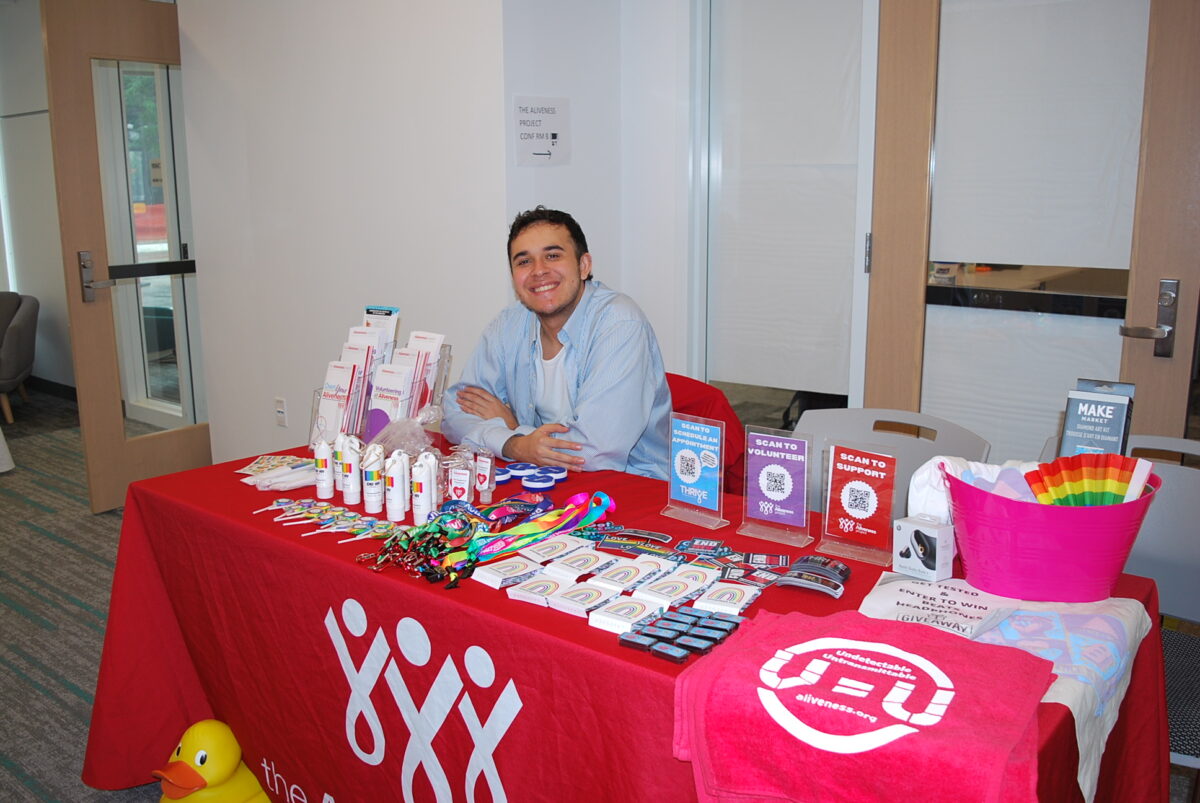
For Ashley Hemnarine, Vice President of Advancement, the Community Resource Fair reflects a core value of The Family Partnership, to “meet people where they’re at.” This value serves our larger commitment to generational healing and wellbeing in Minneapolis.
“Basic needs are one of the most important aspects we’ve been hearing about from families,” Ashley shared. “In order to move from a survival mindset to a healing mindset, folks need to have their basic needs met.”
At the Community Resource Fair, hundreds of individuals and families accessed a wide array of services and resources from local organizations, including:
- 4Evr Sale’ing: Clothes
- A Book of My Own: Children’s Books
- The Aliveness Project: HIV testing
- Art of Counseling: Mental health resources
- Central Minnesota Legal Services: Legal aid
- Emerge Mothers Academy: Resources for single mothers
- Great MN Schools: Education resources
- Hennepin County: Childhood Immunizations, child and teen checkups, mental health assessment scheduling, safer sex supplies
- Hired: Career services
- Minnesota Vikings: Lunch from Vikings Table
- NAMI : Mental health resources
- Open Arms: Nutritional resources
- Our Streets: Games and community resources
- PFund Foundation: LGBTQ+ scholarships and resources
- Phyllis Wheatley: Education resources
- Sabathani Community Center: Food
- Think Small: Early childhood resources
- Transforming Families: Gender identity resources
- Twin Cities Food Justice: Groceries
- The Upton Program: Tools for parenting and pregnant youth
Free Food and Family Fun
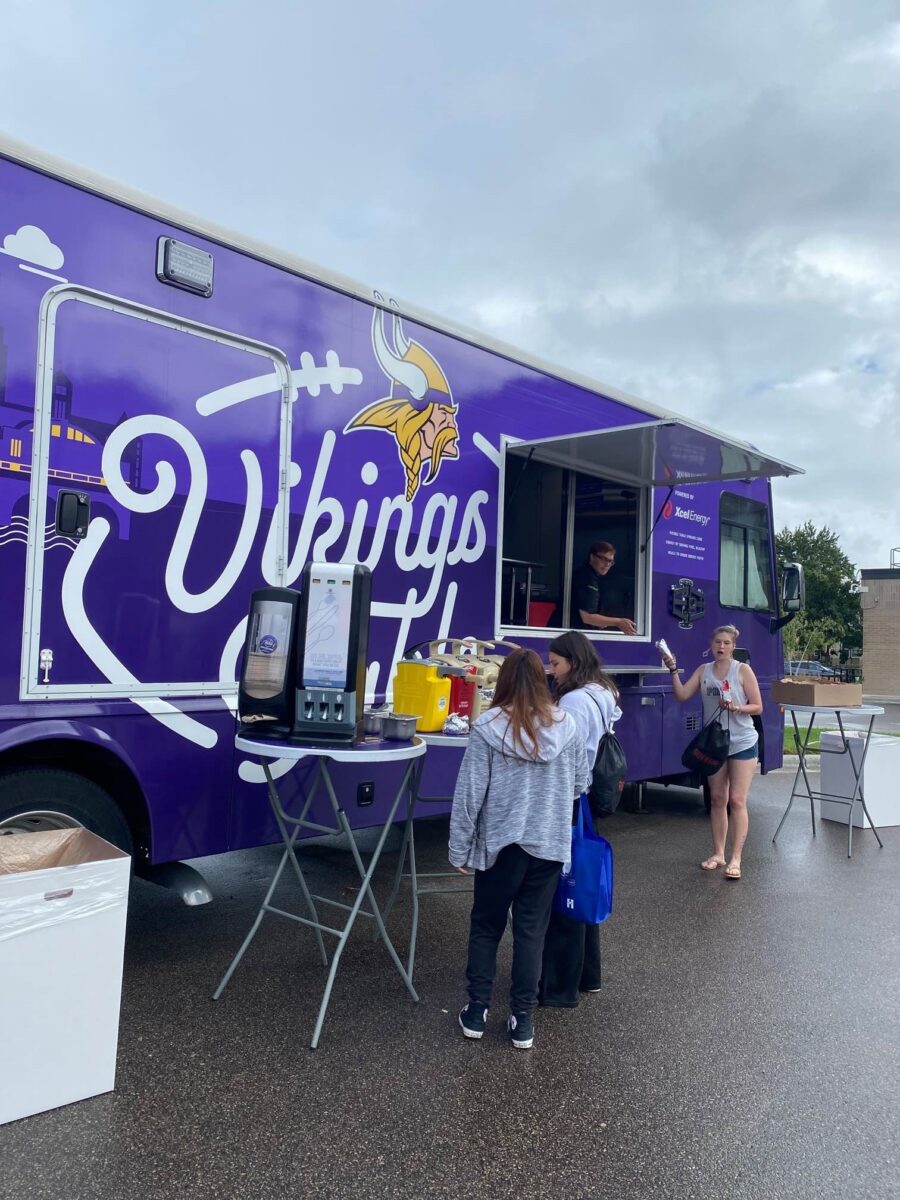
Families who attended our Community Resource Fair enjoyed free burgers and hotdogs courtesy of Vikings Table, the Minnesota Vikings’ food truck. Elsewhere in the parking lot, children jumped in a bouncy house and drew colorful chalk art while their parents and caregivers met with staff from The Family Partnership and representatives from partnering organizations. Inside the building, children chose unique designs for face painting by Phyllis Chatham—everything from Princess Elsa to spiders—and picked out books supplied by A Book of My Own.
Being in community heals us. We are grateful this building is becoming a gathering place for groups, ideas, family resources and joy.
Ashley Hemnarine, VP of Advancement
Meanwhile, grownups had the opportunity to browse clothing items from a clothing drive held by the Advancement Team of The Family Partnership and stock up on grocery bags full of fresh produce provided by Twin Cities’ Food Justice. Families also scored some great take-home gear from our partners including water bottles, sunglasses, snacks, and fidget toys.
Supporting Family Strength Every Day
If you missed the event, don’t worry! The Family Partnership offers services year-round, as do the organizations that partnered with us for the event. At The Family Partnership, more than 3,500 children and adults engage with our 2gen services to heal and build lasting strength.
Our core programs areas include:
- Early Childhood Education and Care
- Mental Health Therapies
- Family Home Visiting
- Anti-Sex Trafficking
If you have questions about which programs are the best fit for you and your family, feel free to contact us. Our team is available to answer questions and help you find the best support for your family’s unique needs and goals.
You can also connect with more resources and services at The Family Partnership’s monthly Community Health Fair, hosted at our South Minneapolis location. Upcoming dates are available on our Events Page. Regular services and resources at our monthly Community Health Fair include:
- COVID-19 vaccines
- MPox vaccines
- Hennepin County nurses
- Rapid HIV testing and safer sex supplies
- STI and HEP C testing and follow-up care
- Wound care
- MNSure health insurance navigation
- Coordinated entry housing assessments
- LGBTQIA+ resources
- Anti-sex trafficking resources
- Legal resources
- Information about recovery and Medication Assisted Therapy
- Naloxone
- Snacks
Generational Healing, Step by Step
Our Community Resource Fair celebrated the healing power of community in south Minneapolis. In this event and our daily work, we are here to help families build a legacy of generational healing and wellbeing. We want to give a shoutout to the amazing volunteers who helped to make our first-ever Community Resource Fair a safe, welcoming, and successful experience for children and families. From set-up and take-down, bouncy-house-supervising to helping visitors navigate the building…we couldn’t have done it without you!
To learn more about volunteer opportunities that support generational healing in Minneapolis, click here.
As I prepare to transition from my role as President and CEO of The Family Partnership, I am filled with a mixture of gratitude and anticipation for the future. I am honored to announce that I will be stepping into a new role as Assistant Commissioner of the new Department of Children, Youth and Families. I am excited that this new position will allow me to work on systems change for children and families at a statewide level – changes I am hoping will benefit the families and children we serve at TFP. This decision was not made lightly, and I am confident that TFP is in a strong position to continue its vital work in our communities.
Reflecting on my tenure over the past two years, I am most thankful for the opportunity to work alongside such dedicated and excellent staff. The relationships I’ve built with families, community members, donors, volunteers, and partner organizations have been deeply rewarding. Together, we have achieved significant milestones that have strengthened TFP’s impact and reach.
One of the accomplishments I am most proud of is the growth in TFP’s national profile. This past June, I had the privilege of representing TFP as a member of the Children’s Home Society of America (CHSA) at a White House briefing focused on whole-family wellbeing. TFP is Minnesota’s singular representative with CSHA. This visit was particularly significant for TFP as it marked our first engagement with national policy. During the briefing, we shared the experiences of families and communities from the Twin Cities and beyond, highlighting innovations that prevent family disruption, strengthen the workforce, and support thriving at both household and community levels.
Another notable achievement was my testimony before Minnesota State legislators during the historic spring 2023 session, in support of executive function interventions for early childhood. Our advocacy led to a $300,000 appropriation resulting in the launch of pilot sites across the state beginning this fall. This funding supports the expansion of EGG Toolkit, which helps 3- to 5-year-old children, educators, and caregivers to build executive function and self-regulation skills during the critical early years. The expansion will include eight early education programs across urban, rural, and suburban Minnesota. These pilots will build on learnings from previous implementations in Minnesota, Wisconsin, and Texas, demonstrating the positive impact of the EGG Toolkit on children and parents/caregivers.
I am also proud of the collaborative effort that has gone into developing TFP’s strategic plan for the next five years. This plan, crafted with input from leadership, staff, board members, program participants, and the Prouty Project, will guide us as we continue to address the needs of children and families in the Twin Cities who face the greatest barriers to success due to racial and economic injustice. Our strategic plan, which will be finalized and announced in the fall, builds on TFP’s 146-year legacy and incorporates our commitment to 2Gen approaches, brain science innovations, and equity. At the heart of our work is a vision of healing and wellbeing across generations in our community.
As I step into my new role, I have full confidence in TFP’s mission and direction. The work of building strong families, vital communities, and better futures for children is more important than ever. I will remain a steadfast friend and supporter of TFP, cheering on the organization’s continued success and the incredible impact it has on the lives of so many.
I want to extend my deepest gratitude to the entire TFP community. To the staff, thank you for your unwavering dedication and excellence. To the families and community members, thank you for your trust and collaboration. To our donors, volunteers, and partner organizations, your support has been invaluable in driving our mission forward. Together, we have made significant strides, and I am confident that even greater achievements lie ahead for TFP.
As I bid farewell as President and CEO, I am excited for the future and the new opportunities that await both TFP and myself. The journey we’ve embarked on together has been transformative, and I am grateful for every moment. Let us continue to work together to create a world where this generation heals so every child and family in the next can thrive.
With heartfelt appreciation,
Dianne Haulcy
Dianne Haulcy, who has served as President and CEO of The Family Partnership since 2022, is transitioning to the role of Assistant Commissioner of Early Childhood at the State of Minnesota’s Department of Children, Youth & Families effective August 12, 2024. In her new position, Dianne can influence systemic changes that benefit children, families, and communities statewide, including those served by The Family Partnership.
“We are immensely grateful for Dianne’s leadership and vision over the past two years,” said Molly Schlobohm, Board Chair. “Her ability to truly listen to the needs of the community and deeply consider what The Family Partnership can do to remain true to its mission has set a strong foundation for our continued growth. We are excited to see the impact she will have in her new role.”
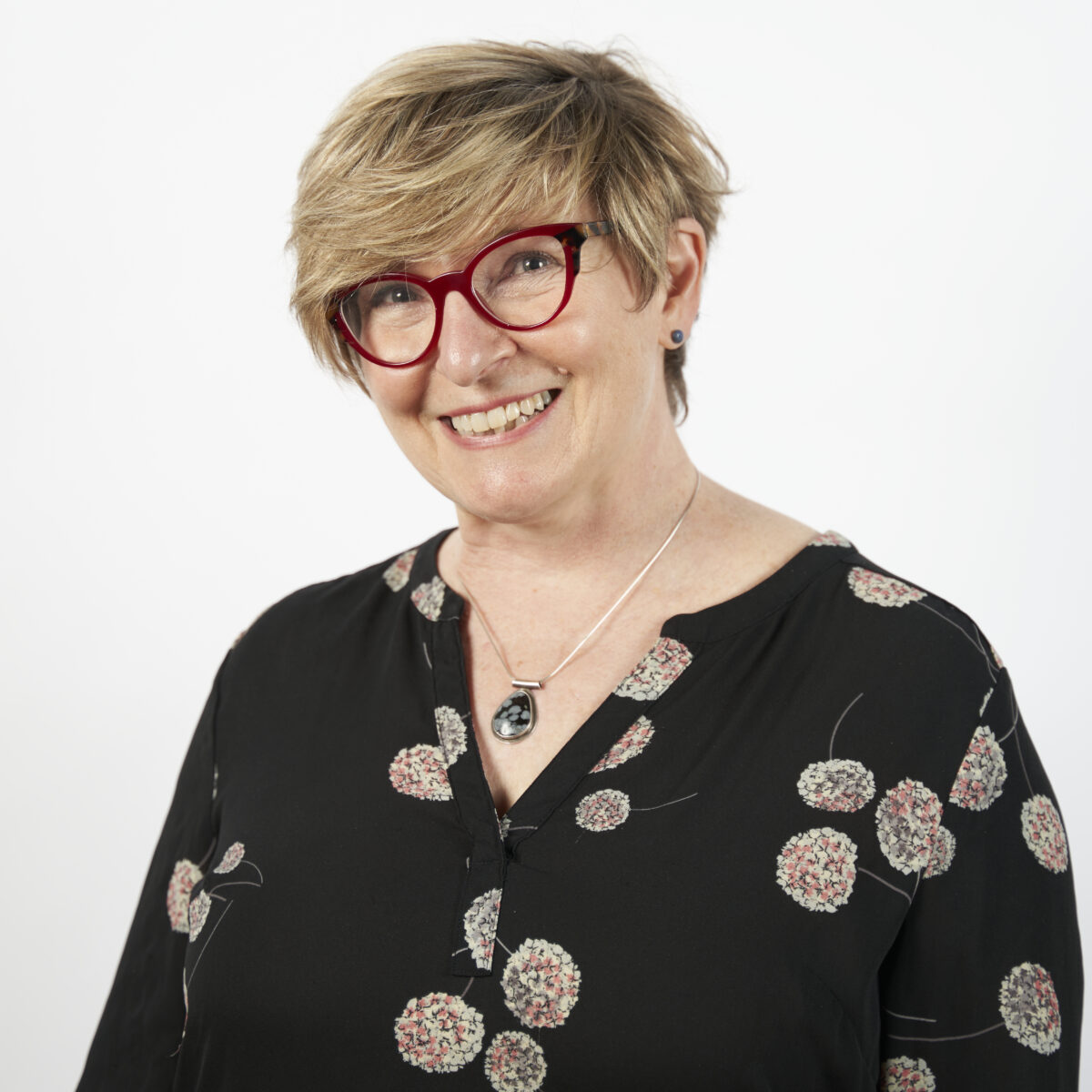
During the organization’s search for a new CEO, Kit Briem, formerly Vice President of Advancement at The Family Partnership, will serve as Interim President & CEO. Kit brings over 25 years of experience in fundraising and leadership roles with Twin Cities social service, art, and philanthropic organizations. Her career includes serving as Executive Director of PFund and holding key development positions at Theater de la Jeune Lune, Graywolf Press, Tubman, United Theological Seminary, and Cornerstone.
“Kit’s extensive experience and deep commitment to our mission make her the ideal leader to guide The Family Partnership through this transition,” said Molly Schlobohm, Board Chair. “We are confident in her ability to continue our work with the same dedication and passion.”
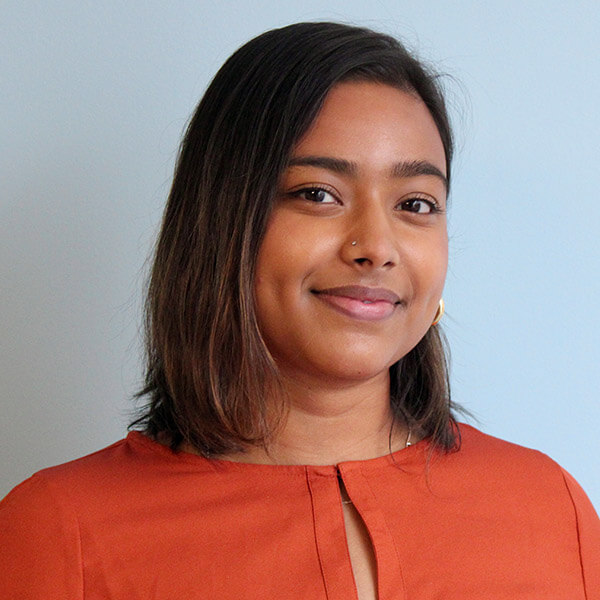
Ashley Hemnarine, previously Development Director, has been promoted to Vice President of Advancement at The Family Partnership. With over five years of experience in fundraising both regionally and internationally, Ashley has a strong background in fundraising strategy and organizational growth. Her career highlights include serving as a Development Associate for a nonprofit focused on strengthening health systems in sub-Saharan Africa, where she successfully raised over $2.3 million and pivoted during COVID-19 to transform an in-person gala into a virtual event, raising over $1 million. Ashley also worked in fundraising for the Hackensack University Medical Center Foundation, where she focused on donor relations and fundraising for the Children’s Hospital. Additionally, she serves as a Board Member and Program Committee Chair for Leaders of Today and Tomorrow (LOTT), an organization dedicated to women’s leadership development. As VP of Advancement, Ashley will cultivate resources to enhance The Family Partnership’s impact and increase its visibility.
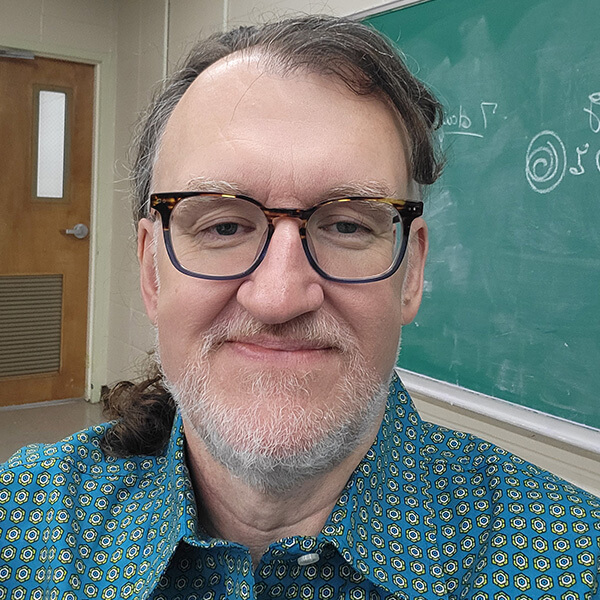
John Everett Till, formerly Senior Vice President of Strategy and Innovation, will now serve as Chief Operating Officer at The Family Partnership. With 26 years at TFP, John has been pivotal in driving program innovation, including the implementation of EMPath’s Mobility Mentoring economic coaching approach, and the development of the EGG Toolkit, a groundbreaking curriculum for early childhood programs that boosts executive functioning for preschool children and their parents. As COO, John oversees all program areas and continues leading TFP’s 2Gen and brain science-informed strategies.
As The Family Partnership moves into a new chapter, these leadership transitions reflect the organization’s ongoing commitment to innovation and impact through services. We remain steadfast in our work to support healing in this generation, so the next generation thrives.
For more information, please contact Stephanie Goodwin (she/her), Communications Manager, at www.thefamilypartnership.org
The Family Partnership Announces Eight Pilot Sites Across Minnesota to Implement EGG Toolkit, a Groundbreaking Executive Function Curriculum for Early Childhood.
Minneapolis, MN
The Family Partnership has selected eight early education programs across Minnesota to implement EGG Toolkit in the 2024-25 school year. The purpose of the pilot is to build on learnings and outcomes from previous pilots in Minnesota, Wisconsin, and Texas. By evaluating impact in urban, rural, and suburban communities within Minnesota, the pilots will demonstrate EGG Toolkit’s positive impact on children and parents/caregivers and build capacity to effectively scale more broadly.
The Family Partnership designed EGG, short for “Empowering Generational Greatness,” in 2017 with Christine Wing, CCC-SLP, PhD, in collaboration with early childhood educators and leading experts in brain science, child development, and curriculum design. EGG helps children develop executive function and self-regulation skills during the critical years of early childhood, the stage when brain development is at its fastest and most foundational.
Thanks to chief authors Rep. Carlie Kotyza-Witthuhn and Sen. Kelly L. Morrison, and authors Sen. Dave Pinto, Sen. Mary Kunesh, Rep. Nathan Coulter, and Rep. Emma Greenman, the state of Minnesota passed legislation in 2023 that included $300,000 to help The Family Partnership expand pilots in six sites across Minnesota in urban, suburban, and rural settings. The Donaldson Foundation funded the expansion to an additional two sites.
“We cannot deny the adverse impacts of the isolation and constant stress the COVID-19 pandemic has had on our youngest learners and their parents,” says Dianne Haulcy, President and CEO of The Family Partnership. “We desperately need interventions like this to support children’s cognitive and emotional development, and support positive, responsive parenting. This curriculum equips children with tools to develop language that describes their feelings and experiences rather than acting out on impulse. When children are empowered with this language, they learn to ask for help, talk about their emotions, and better understand their experiences. This is particularly important for children and parents living in high-stress environments.”
Trinette Potts, EGG Project Manager at The Family Partnership, will lead implementation, training, and professional development with the following sites partnering for the 2024-25 pilot expansion of the EGG Toolkit:
- Wilder Child Development Center, 80×3 site, St. Paul
- Wilmar Early Childhood Family Programs, ECFE, Wilmar
- New Horizon Academy, Rochester
- New Horizon Academy, Minneapolis, Lake Street
- Early Childhood Family Services, ECFE, Eagan*
- Osseo Area SchoolsECFE, Osseo
- People Serving People 80X3 site, Minneapolis
- Noah’s Ark Preschool, Circle Pines
*This ECFE is a partnership between the Eagan, Apple Valley, and Rosemount school districts.
John Everett Till, SVP of Strategy and Innovation at The Family Partnership and EGG Enterprise Manager, says teachers and facilitators are eager to get started. Till says, “The good news is that we can buffer kids against toxic stress, and that’s what our intervention is designed to do. We’re ready for this pilot expansion and we look forward to presenting a report to the legislature about the impact of scaling our early childhood intervention in urban, suburban, and rural communities.”
####
About The Family Partnership
The Family Partnership is an accredited, multicultural human services organization that has worked since 1878 to meet the evolving needs of Twin Cities families facing barriers as a result of racial and economic injustice. Today, TFP is at the forefront in implementing evidence-based practices, emerging brain science, and centering equity, inclusion, and anti-racism work to effectively build well-being within the communities we serve. Agency-wide, the commitment to evidence-based practices has led TFP to implement two-generation (2Gen) strategies across our programs. Research shows that 2Gen services, which engage children and their parents/caregivers together, are more effective at building intergenerational wealth, well-being, and prosperity.
About EGG Toolkit
EGG Toolkit is The Family Partnership’s groundbreaking executive function curriculum for early childhood. EGG engages children ages 3 to 5 in activities focused on language, storytelling, and mindfulness to build focus and resilience: key capacities for success in school and life. By building these core capabilities, EGG helps to buffer children against the harmful impacts of ACEs, closing opportunity gaps in childhood and supporting a lifetime of better outcomes for physical, mental, and behavioral health. For more information, visit eggtoolkit.org.
####
Contact:
Stephanie Goodwin (she/her)
Communications Manager
The Family Partnership
sgoodwin@thefamilypartnership.org
On May 8, The Family Partnership welcomed guests, staff, and volunteers to our 2024 Better Together fundraising luncheon. Dianne Haulcy, President and CEO, spoke to the healing power of relationships in The Family Partnership’s work. The event also featured inspiring stories from Ms. Linda Wilson, foster mother, and Ae Vang, outpatient therapist, who have partnered together in support of children’s healing.
We invite you to experience some of the best moments from this year’s program below!
Dianne Haulcy, President and CEO, highlights the “tremendous outcomes” achieved as a result of trusting relationships between families and staff.
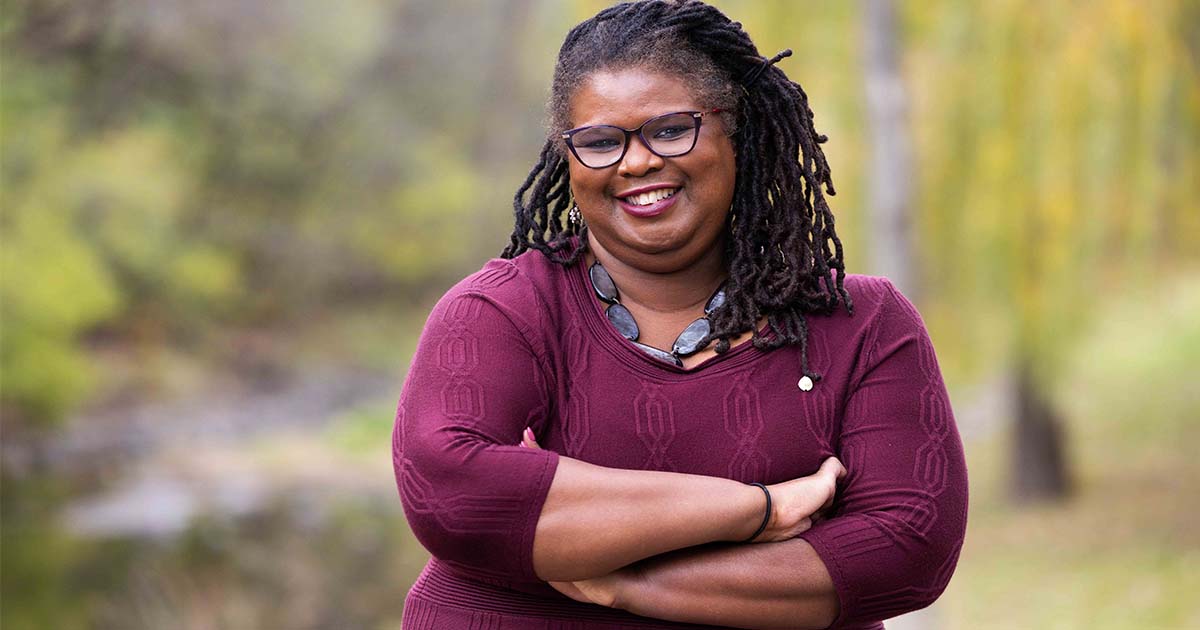
Dianne Haulcy has led The Family Partnership as President and CEO since 2022. Haulcy brings more than 25 years of nonprofit executive leadership and advocacy on behalf of children and families of color in Minnesota. She also created and hosts MPR’s Little Moments Count Early Risers podcast that discusses how to talk to young children about race and racism.
One of the core beliefs that guides The Family Partnership’s work is that ‘people change in the context of relationships.’ We believe this to be true because there is ample research to support this claim, and because we witness it over and over in our programs.
Of more than 3,000 individuals we served last year, the majority are confronting barriers related to poverty, racism, and other systemic injustices. This looks different for every family but can include daily stressors about putting food on the table and keeping a roof overhead—not to mention what those burdens do to a person’s physical and mental health over a lifetime.
Every one of the individuals we serve has a relationship with at least one TFP staff—someone who has built trust and supported them on their healing journey.
As a result, together we have achieved tremendous outcomes:
- 100% of children in our preschool programs graduated kindergarten ready, nearly double the statewide average for children living in low-income households;
- 89% of youth in mental health counseling reported stronger family relationships; think about how stronger family relationships can help teens navigate those turbulent years; and lastly,
- 93% of participants in our anti-sex trafficking program, PRIDE, decreased involvement in the commercial sex industry.
Our staff leverage a 2-generation approach and evidence-based practices in the context of trusting relationships. That means we meet people where they are at and we honor their strengths, even as we bring our expertise. When people TFP serves feel seen and their strengths are honored, you’d be amazed how they find a way where there was seemingly no way before. They break through barriers and create new legacies for themselves and their children.”
Ms. Linda Wilson, foster mother, shares how children in her care experience healing at The Family Partnership.
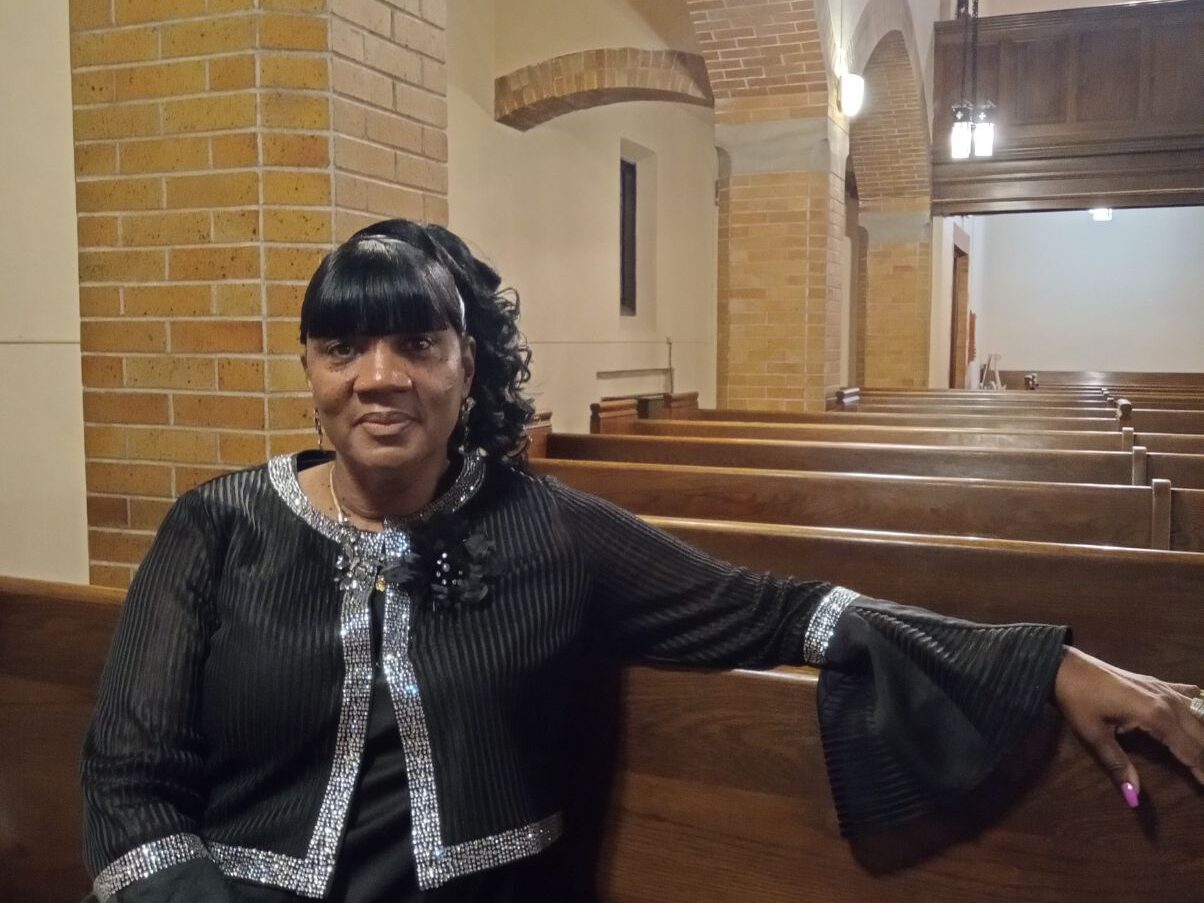
Ms. Linda Wilson has been a foster mother for over 32 years through Hennepin County, serving “more children than she can count.” Over the past twenty years, Ms. Linda has brought many of her children to The Family Partnership for mental health therapy.
I have witnessed firsthand the love, confusion, and distress of children in foster care as well as their parents as they went through times of displacement and uncertainty.
Ms. Linda Wilson, foster mother
Any child who has been taken from their home environment no matter how awful that environment may have been has experienced trauma. Whether from the actions of the home, family or situations or from the actual process and effects of the removal, they have gone through a traumatic experience.
When I first found The Family Partnership about 20 years ago, I knew I’d found a place for my children to experience healing through therapy. Many of my children have benefited tremendously from their time sorting out their emotions and life struggles with support from a therapist. Healing in therapy takes time but within a few months I would notice some positive changes in each of the children. Some changes happened slower than others, but change did happen.
Once, I remember a child who moved around like the tin man from Wizard of Oz, extremely tensed and rigid, totally stand offish and guarded. With support through mental health therapy at The Family Partnership, he slowly started to put down his walls and became more receptive to warm friendly conversations, smiles and interactions with people whom he came in contact with.
I am thankful for therapists like Ms. Ae (Dr. Ae as the kids and I call her) who have helped my children to heal from their heart and head hurts!”
Ae Vang, Outpatient Therapist, describes the way a 2gen approach builds on family strengths and leads to healing.
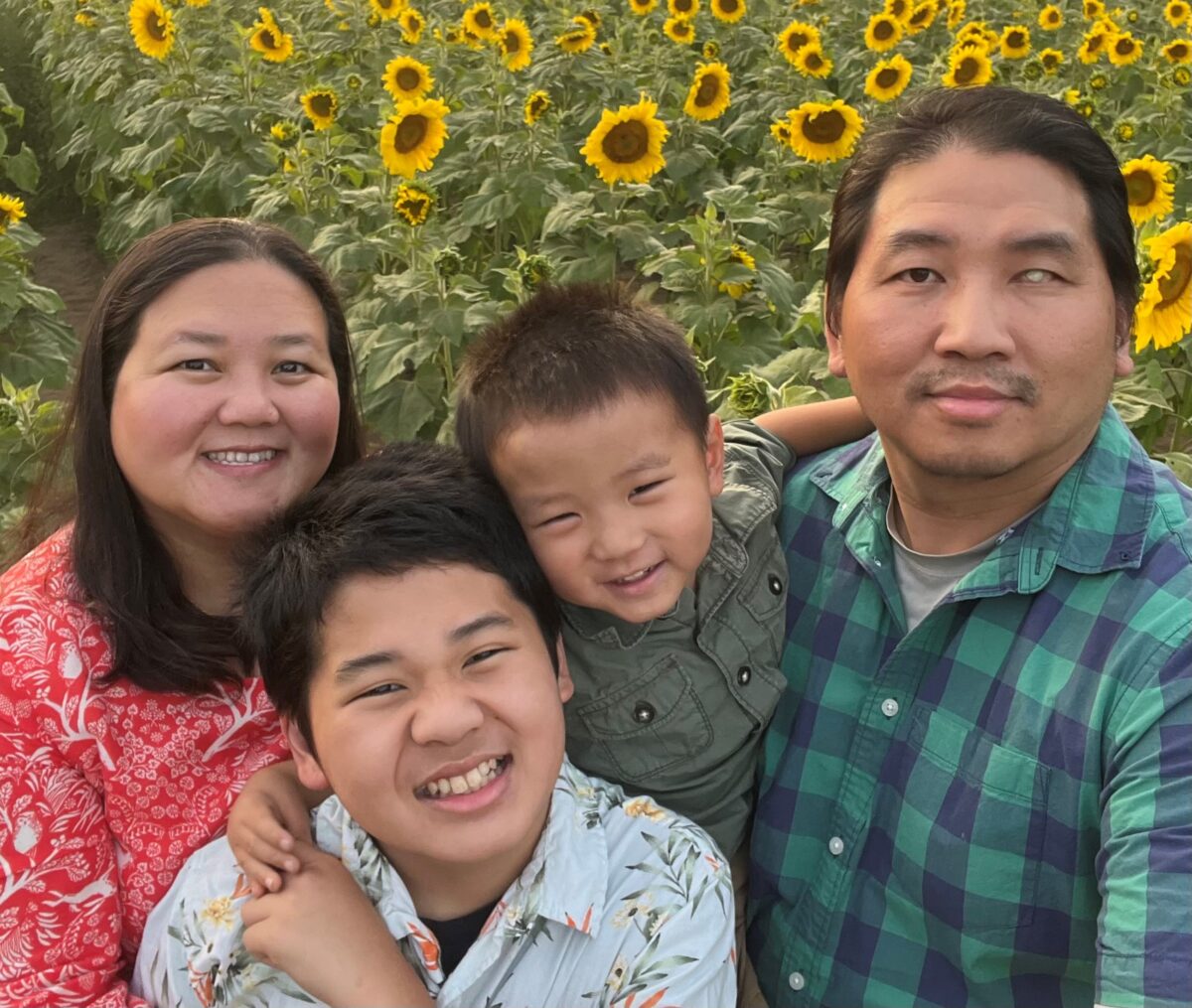
Ae Vang, MSW, LICSW, is an outpatient therapist with The Family Partnership (pictured here with her family). She works with children, adolescents, and adults, providing services in English and Hmong. Her experiences as the first-generation daughter of Hmong refugees and adult with Adverse Childhood Experiences (ACEs) impacted her decision to become a therapist. She has worked with many children and families, including Ms. Linda’s, utilizing a 2-generation or whole-family approach.
Even though I may be meeting with an individual child in therapy, this little person is part of an ecosystem.
Ae Vang, Outpatient Therapist
If that system is not stable, their healing process takes longer or in some cases it never starts because parents pull their kids from therapy. Without addressing stressors that parents face, therapy can become just another stressor. However, by utilizing a 2-generation approach, it allows conversations to take place that will not only help the child but the whole family heal.
One preteen client that I worked with had a disability due to illness. They spent a lot of time in isolation, appearing irritable, expressing suicidal ideation, and when asked to draw a self-portrait could only portray themself as a ghost or monster.
At first, I worked with just my client and their mom, but as I got to know the family better it became clear that Dad held the key to my client’s healing. Dad believed himself to be responsible for their disability, even though he made the best-informed decisions he could at the time. This had become his child’s whole identity to him—they were a reminder of his shame.
As I started working with both Mom and Dad on their grief, eventually Dad was able to change the narrative surrounding his family and be the support my client needed to overcome their struggles. Eventually my client graduated from therapy and started high school. Recently I received an update that they made a friend at school, something their parents did not think would happen because they had been a loner since starting kindergarten.
The Family Partnership’s 2gen approach affirms that all families have strengths, and my role as a therapist is to partner with families to build on those strengths.
I am happy to say that by practicing a two-generation approach in my work at The Family Partnership, I am working as a partner with parents towards the goal that nearly all share in bringing their children to therapy: to create a better future for them, and the generations to come.”
Dianne Haulcy announces The Family Partnership is prioritizing early interventions to preserve families and protect children from the trauma of separation.
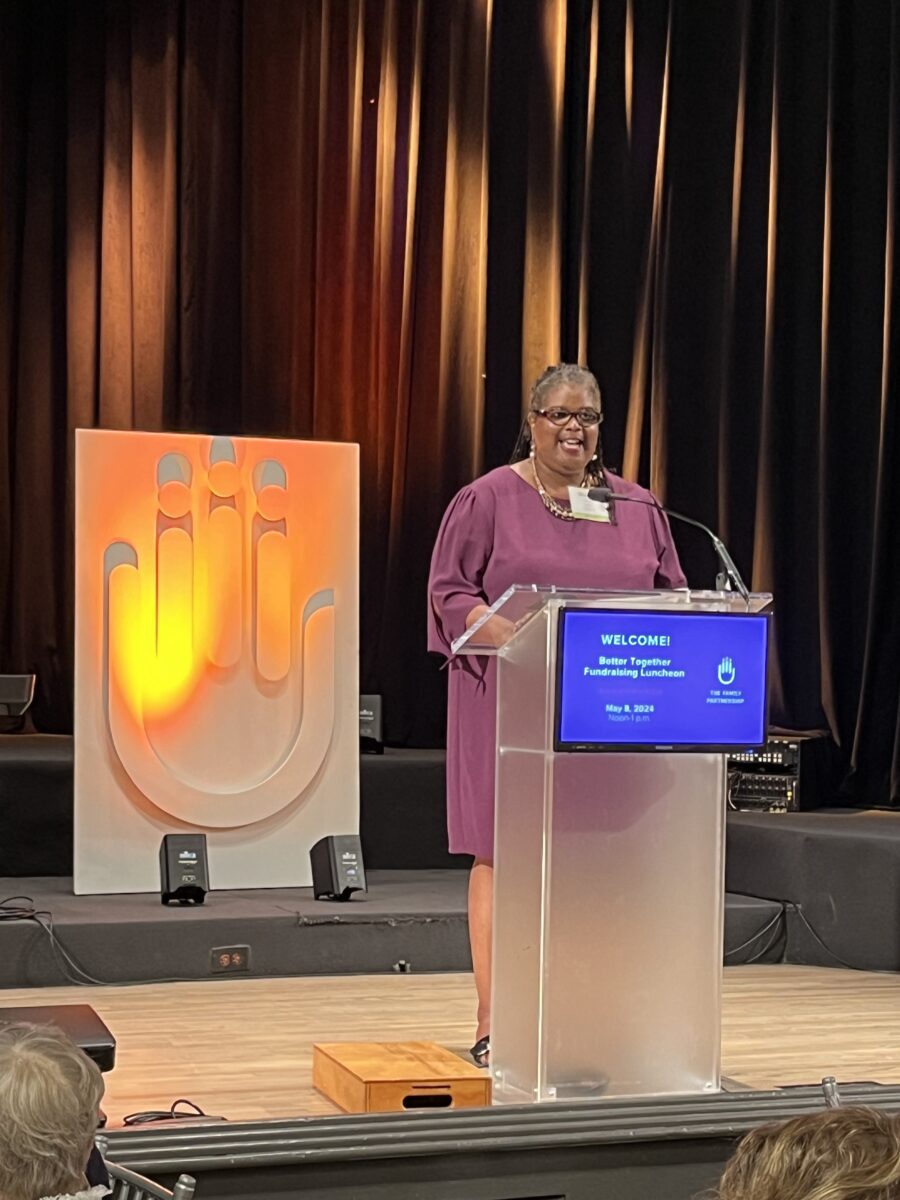
Dianne Haulcy announces that The Family Partnership is exploring the possibility of becoming a Family Resource Center in South Minneapolis.
For 145 years, The Family Partnership’s work has reflected each generation’s evolving needs and goals.
Dianne Haulcy, President and CEO
Current research shows that toxic stressors like poverty, racism, and other forms of systemic injustice harm a pregnant parent and their baby’s developing brain and nervous system. The earlier we partner with parents and caregivers, the better for their children’s opportunities and outcomes.
As such, we’re exploring the possibility of becoming a designated Family Resource Center in South Minneapolis. This will allow TFP to provide additional services and resources beginning as early as pregnancy and birth that are proven to preserve families and protect children against the trauma of separation.
It’s true that most of the parents and caregivers we serve experience toxic stress, and many have also experienced trauma as children themselves. They want to disrupt the cycle—but they need some support to learn how. After all, “You can’t give what you never got.”
For most people, healing work is too heavy a burden to bear alone. No one should be expected to transmute their own pain, and the pain of their families, communities, and ancestors without support. Our work at The Family Partnership is to meet people where they’re at and honor their strengths—so they can face the past with courage and build toward a future with hope.
Valerie Kaur, in her book See No Stranger, talks about developing a revolutionary type of love that is not a culmination of emotions and romanticism but of “sweet labor,” something we choose to do every day. That is the kind of work all of us at The Family Partnership do, bringing people closer together to do the important work of healing.
Your support helps this generation to heal, so the next generation thrives.
Our partnerships make us strong. Consider a new or increased monthly gift in any amount, and your donation will be DOUBLED up to $50,000 until the end of May!
You can also check out our volunteer opportunities, donate your gently used clothes to our drop-in center, or fulfill items from our PRIDE wishlist on Amazon.
For more information on how to help generational healing in Minneapolis through The Family Partnership, contact Ashley Hemnarine, Development Director.
We recently interviewed Amber Pierce, artist, entrepreneur, and graduate of The Family Partnership’s Parenting for the Future (PFF) home visiting program, about her experiences with TFP’s 2Gen programs. Amber joined us with her three children, sitting near two of Amber’s recent artworks, including a large collage and acrylic painting of Simone Biles. In this piece, Biles’ stares straight ahead in concentration, and her strong legs are stretched out to the sides as if in flight. Amber’s daughter, Aadon, was seated in front of the painting with her face just inches from the canvas when she turned to say with a smile, “That’s my mom’s art.” Later, we mentioned this moment to Amber who laughed and said, “To them, I’m the biggest thing ever.”
Watching Amber with her children, she appeared confident and completely present in her interactions with them. But that was not always the case. In 2018, Amber had Aadon, who was two at the time, and found out she was pregnant with twins. She said, “I felt like I didn’t have any of the things I needed.” She was overwhelmed and lacked childcare and support. A social worker mentioned The Family Partnership and Amber reached out for help. Amber has struggled with depression since she was young and sustained a Traumatic Brain Injury in a car accident in 2006. As a result, Amber struggles with routine and consistency in her daily life.
Iman Omer, Parent Educator in Parenting for the Future, began working closely with Amber and her children in 2022, providing support and services following a two-generation (2Gen) approach. A 2Gen approach serves both the needs of children as well as the needs of their parents and caregivers, recognizing that both are essential to moving a family forward. As one of TFP’s 2gen programs, PFF works with parents who have cognitive limitations that affect their parenting. The program provides parenting education, community resources, and joint activities for parents and children so they can connect and strengthen their relationship. While working with the parents on their parenting skills, parent educators also work to make sure that the children are developmentally on-track.
Iman visited Amber and the children weekly in their home and used the Circle of Security Curriculum, an 8-week course to help parents and caregivers connect with their children. Iman and Amber did a lot of parenting education work together, too. When Iman introduced the Circle of Security to Amber, they discussed the importance of understanding and meeting her kids’ physical and emotional needs. This includes providing a secure base to support their exploration and providing a safe haven to welcome them back. Amber was always comfortable with welcoming her kids back and providing that safe haven but she struggled with supporting their exploration. Specifically, she didn’t always enjoy certain activities with them, such as going to the park, because she was exhausted. Iman worked with Amber to set up a plan and routine that would allow her to get rest and feel energized so that she could enjoy outdoor activities with her kids. This is the type of concrete guidance that Amber found to be especially helpful.
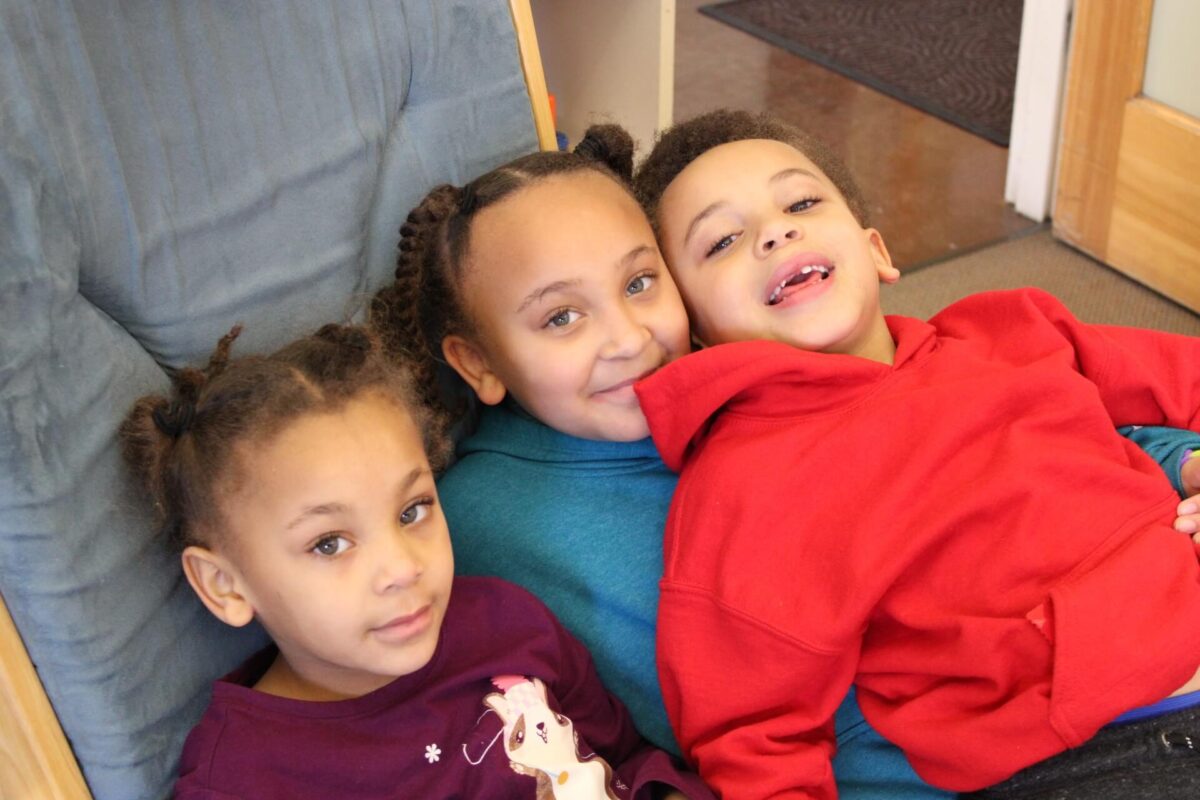
Iman worked with Amber to build a supportive environment for her family. She connected Amber with a cleaning service, helped find preschool care for the twins, and supported Amber in finding a therapist through The Family Partnership. In addition, Amber attended the bi-weekly parenting support group. Parent Educators facilitate this group for parents, foster parents, and caregivers participating in TFP programs and is an opportunity for participants to connect and support each other.
The parenting group was an outlet for Amber to get out of the house with Aadon which gave them both a sense of routine. With Amber’s cognitive challenges, routine is very helpful. The family participated in activities and field trips with other families in the parenting group, which Amber found to be very beneficial in terms of consistency and social interaction. The support group also provided families with resources, a meal, and activity time. TFP staff provided free childcare on site, allowing Aadon, and eventually the twins, to connect to other children. It also allowed Amber and other parents to connect with each other. She said that this support was essential for her, and it gave her children a mom who had a long-term support system.
Today, Amber has gained confidence in her unique skills and role as a mother. She described her mental health and cognitive differences as “different wiring,” and that “it’s been important to honor my neurodivergence. I’ve not always been successful working a 9-5 job, so, I went into entrepreneurship…I’m always looking at ways to advance myself.”
I am able, I have to find my own way to navigate the journey.
Amber Pierce
Amber’s career has grown out of art which has always been a passion for her. She attended an arts and communications magnet school and later graduated from the Perpich Center for Arts Education. Amber found her voice working through her mental health issues and neurodivergence and creating art. “Art is an innate outlet for me.”
Amber uses collage and acrylic paints to create her pieces. She said she starts with a vision board and then “pours her intentions into the piece.” She asks herself, “Why am I creating this and what energy do I want to capture?”
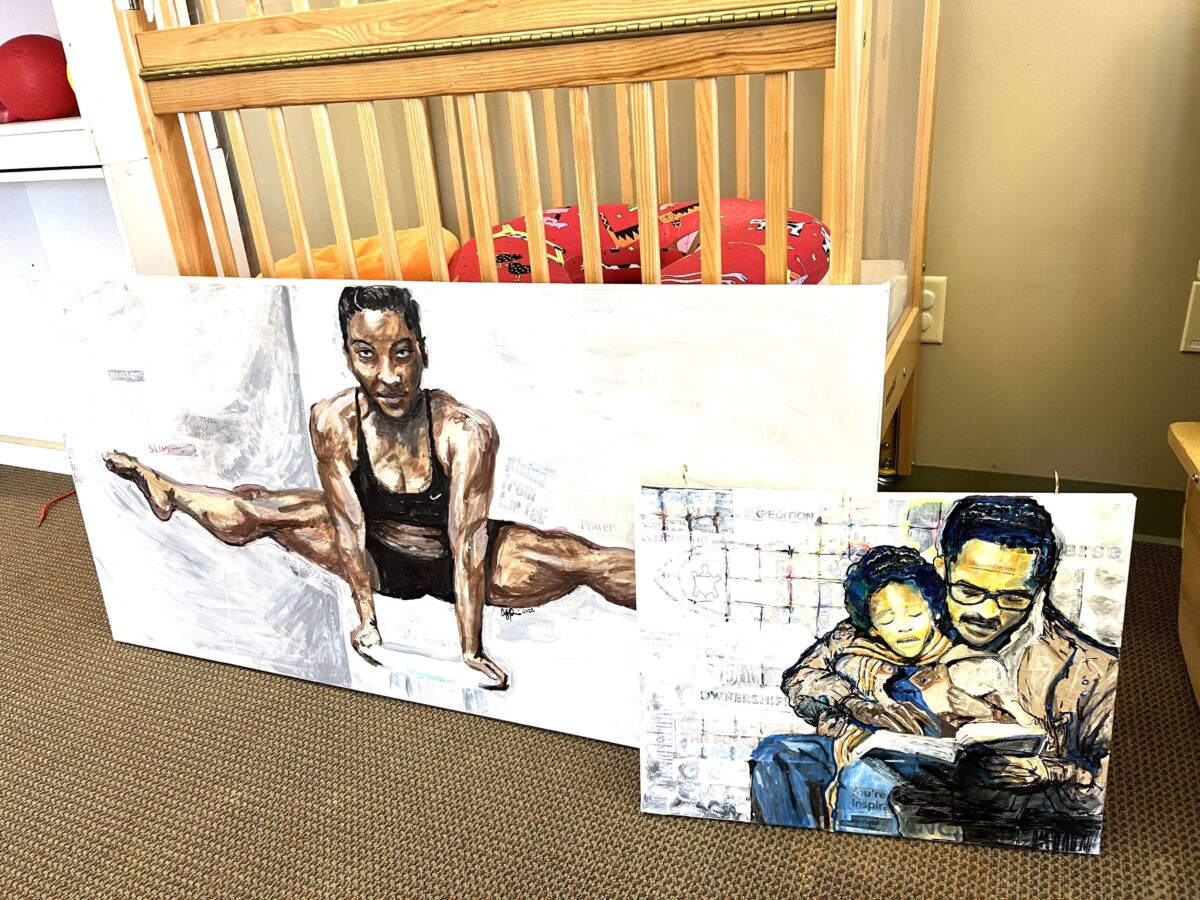
Today, Amber has created an LLC called Creation Elevation and is working with a business coach. She hopes to continue to grow as an entrepreneur and would also like to include her family in her creative and entrepreneurial work.
Amber shares her story with others because she wants people to understand that “Neurodivergence is a wide spectrum and that people who struggle still want to make an impact on others.” She hopes to get rid of the stigma associated with mental health challenges and the need for support. She’s also vocal about the role that The Family Partnership played in her journey so far, “It gave my children kind of the peace of having a mom that had a support system and, for my mental health, to be able to parent them was really important to have that resource for me.” Amber’s experiences is just one example of how a 2Gen approach benefits the entire family.
If you or someone you know would benefit from our Parenting for the Future program and our 2Gen approach, you can find more information on the program’s webpage.
The Family Partnership is working with the Minnesota Department of Revenue to help spread the word about the new tax credits for individuals and families.
Even if you do not have to file a Minnesota income tax return, you can still file to get tax benefits. There are five credits you may be able to claim that may help you pay less taxes and get a bigger refund.
1. Minnesota Child Tax Credit
If you have children, this tax credit can lower the amount you owe or give you a refund.
Am I eligible for the Minnesota Child Tax Credit?
You may qualify if:
- You were a full-year or part-year resident of Minnesota in 2023
- You are not a dependent of another person
- You have one or more qualifying children as defined by the IRS
How much is it?
The maximum credit is $1,750 per child under age 18 and there is no limit on the number of children.
2. Minnesota Working Family Credit
The Minnesota Working Family Credit gives tax relief to people whose income is below a certain level. This can reduce the amount you owe in taxes or give you a bigger refund.
Am I eligible for the Working Family Credit?
You may qualify if:
- You were a full-year or part-year resident of Minnesota in 2023
- You are not a dependent of another person
- If you are married and you or your spouse are a nonresident alien, your filing status must be Married Filing Jointly
- If you have no qualifying children, you and your spouse must have resided in the U.S. for more than half of 2023
How much is it?
If your earned income is $8,750 or more, the credit depends on the number of qualifying children:
- $350 for no qualifying children
- $1,275 for one qualifying child
- $2,450 for two qualifying children
- $2,850 for three or more qualifying children
3. K-12 Education Credits
Have you bought school supplies for your kids in kindergarten through high school? Save the receipts! There are two K-12 Education Credits that can result in savings for you.
Last year, more than 17,500 families received the K-12 Education Credit and saved an average of $282. Over 138,000 families received the K-12 Education Subtraction with an average savings of $1,285.
Am I eligible for the K-12 Education Credit or Education Subtraction?
You may qualify if:
- You purchased educational services or materials to assist with your child’s education
- Your child is attending kindergarten through 12th grade at a public, private, or home school
What counts for this credit?
Here are some examples of things that count:
- School supplies (pencils, paper, calculators)
- Educational computer hardware and software
- Tutoring by a qualified instructor
- Buying or renting musical instruments used during school
Are there income limits for these credits?
- K-12 Education Credit: Your adjusted gross income must be below the levels shown here:
- 1 or 2 children, $76,000
- 3 children, $79,000
- More than 3 children, $79,000 plus $3,000 for each additional child
- K-12 Education Subtraction: There are no income limits for the education subtraction.
4. Property Tax Refunds for Homeowners
If you are a homeowner, you might qualify for a property tax refund.
Am I eligible for property tax refunds?
There are two types of property tax refunds for homeowners:
- You may qualify for the regular property tax refund if:
- You owned and lived in your home on January 2, 2024
- Your household income for 2023 was less than $135,410.
- You may qualify for the special property tax refund if the following are true:
- You owned and lived in the same home on January 2, 2023, and on January 2, 2024
- Your home’s net property tax increased by more than 12% from 2023 to 2024
- The net property tax increase was at least $100
- The increase was not because of improvements you made to the property
Unlike the regular refund, there is no income limit to claim the special refund.
You may file for the Property Tax Refund on paper or electronically by August 15. You have up to one year after the due date to file.
5. Property Tax Refund for Renters
If you are a renter and your household income is less than $73,270, you may qualify for a property tax refund for renters.
What do I need to claim the refund?
- A completed Form M1PR, Homestead Credit Refund (for Homeowners) and Renter’s Property Tax Refund.
- A copy of your Certificate of Rent Paid (CRP).
- You will receive one CRP for each unit you rented during the calendar year.
You may file for the Property Tax Refund on paper or electronically by August 15. You have up to one year after the due date to file.
You may also qualify for free tax help! Find free tax preparation information.
This information can be found in summary on our Minnesota Tax Credits page. You can also reach out to the Minnesota Department of Revenue for more information and help:
Minnesota Department of Revenue
Phone: 651-296-3781 or 1-800-652-9094
Website: Minnesota Department of Revenue
This service made available through a grant provided by the state of Minnesota.
